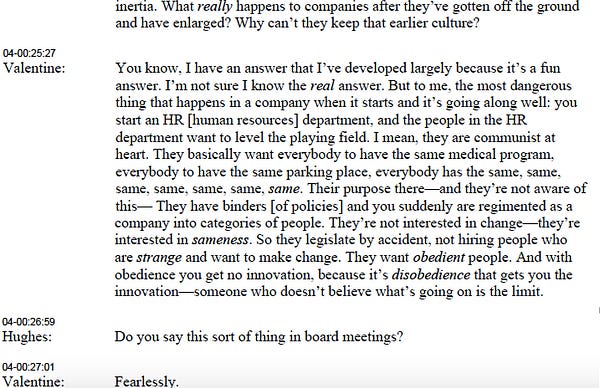2nd order effects, 'pursuing' hot founders, & HR as evil
Sajith Pai's weekly newsletter #2020-02
Writing: ‘Early notes on the Facebook-Jio deal: implications and 2nd-order effects’
Last week’s big story, barring COVID-19 news which of course continues to dominate our airwaves and cyberspace, was Facebook’s $5.7b investment in India’s leading mobile operator Jio Platforms. There is a lot going on in here including
Jio’s need for cash (their debt is piling up and the glut of oil means the petroleum business valuation became a little harder to unlock) as well as their desire to leverage whatsapp to aggregate kirana /(mom & pop grocery) stores
Facebook’s desire to explore how much they can juice whatsapp’s strength in the Indian market. At about 400m users (MAUs), whatsapp defines the borders of Indian internet. For a large number of India3 users, whatsapp is the internet. I presume that the long-pending payments license will finally happen thanks to having Reliance in their corner.
Lots more though, and I wrote about how it work as well as the second-order effects of it across the Indian startup world in this piece here. Incidentally, the piece was also published on CNBC TV18 and on the smallcase blog. I am also quoted on a Forbes piece on the same. Phew!
Podcast: ‘20 Minute VC: Index Ventures + Notion’
I enjoyed listening to the 20 Minute VC podcast on the recent Index Ventures-led $50m round in collaboration app Notion valuing it at $2b. It featured Harry Stebbings, the host, chatting with Index Ventures partner Sarah Cannon and Notion’s COO Akshay Kothari.
The first few minutes, when Sarah Cannon described how she ’pursued’ Ivan Zhao and Notion (Harry Stebbings used the word ‘stalker’) was particularly interesting. It reminded me of this wonderful tweet by a young engineer at Figma.

Other interestingness from the podcast:
Notion took 4 yrs to launch. The 1st angel round was in '13 in which Akshay Kothari participated. Mentioned that Naval was one of the first investors. For a long time, Akshay didnt think it was going anywhere till it finally launched in ’17. Akshay joined '18.
The product as we use it now was built by 3 engineers. Till 18m back, Notion was <10 people.Remember reading that Substack was just 3 members (total) when they raised $15m from A16Z. Why why why do we hire so many so early in India?!
On this topic, Akshay Kothari says: Notion has a culture of building systems vs throwing people at it, e.g., systems helped each support rep handle 2x number of tickets that industry average is.
WFH impact - Sarah Cannon: Empathy / vulnerability is more apparent now in the workplace - we are tolerant or even appreciative of people’s kids jumping in to conversations. We are open to people’s full lives.
Akshay Kothari: $1000 laptop - some people build products on it, and some people use it as a fancy typewriter. Notion is a bit like that - can be used for Notes, or to build a company. Versatility is a big feature. Compares Notion to paper - a single medium allowing us to do diverse tasks. He said that they have this huge ambition of allowing people to shape their own tools to structure their own lives.
Detailed notes here.
Readings
(1) The early days of venture capital is a favourite reading topic of mine. Not too many books on this. One interesting find thus were the oral history archives at the Computer History Museum and the University of California, Berkeley. I have read two transcripts thus far; one of investor Pierre Lamond and the other of the legendary Don Valentine, founder of Sequoia Capital. Fascinating stuff. More on them in a later piece. Here is a little tidbit from the Don Valentine transcript.


(2) Like all other global chemicals supply chains impacted due to COVID-19, the illegal drugs supply chain (coke, opioids, meth etc.) has also been hit. Street prices are up, supplies are low. Multiple reasons abound for the disruption - the obvious ones of course being border closedowns and trade / transport drops in general which make transport hard, and one non-obvious one, that Wuhan, the epicentre of COVID-19 infections is also the fentanyl (a common opioid) capital of the world! Link.
(3) Will Bonsall is a 71-year farmer in Maine trying to keep one of the world’s rarest collections of seeds (outside of university or institutional hands) going. Sadly for us, he is running out of time, and money. Link.

That’s all, folks! More next week.




Great article, Sajith.
The HR one through Don Valentine transcript which you shared is really an eye opening one along with the second order effects of Jio - Facebook deal.
What are your thoughts related to modern HR practices, OKR's etc as a proper balance between systems and practices might be essential but it do hampers the innovation aspect?